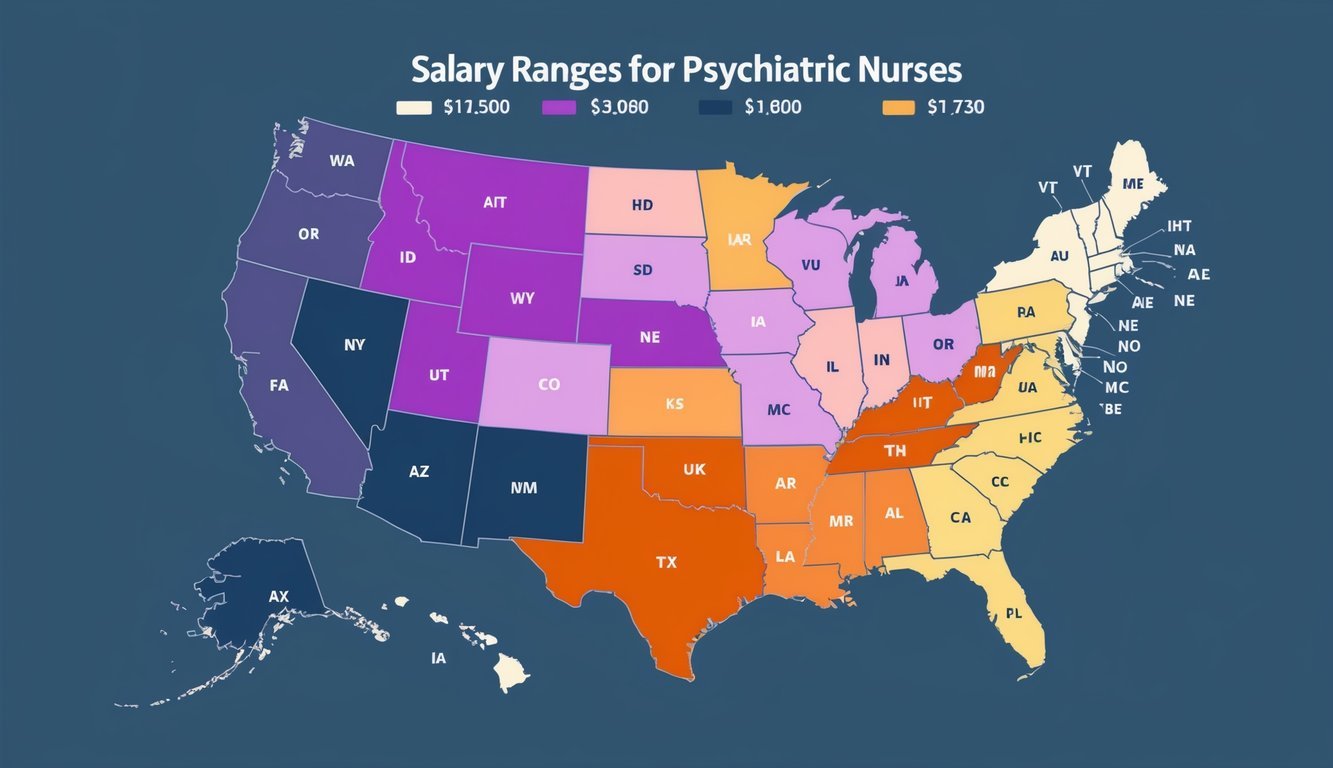As a psychiatric nurse, you play a crucial role in the healthcare system by providing essential mental health care to individuals in need. The private industry offers an average salary of approximately $98,879 for a psychiatric nurse.
Meanwhile, those in state and local government settings earn around $99,020. These figures reflect the growing demand for mental health professionals and signify the value placed on your expertise in this vital field.
Considering the variety of settings in which you can work, including hospitals, clinics, and community health organizations, your earning potential can vary.
For nurses with less than one year of experience, the hourly wage starts around $29.47, increasing with experience.
For example, those with 5-9 years can earn about $32.47 per hour, while late-career nurses (with 20+ years) typically make around $36.17 per hour.
The need for skilled psychiatric nurses continues to rise, driven by an increasing awareness of mental health issues and a growing number of healthcare jobs focused on this area.
Understanding the salary landscape can help you evaluate your career path and make informed decisions about further education and certifications in mental health nursing.
For more details on salary trends and job prospects, you can explore How to Become a Psychiatric Nurse.
Understanding Psychiatric Nurse Salaries
Psychiatric nurses play a crucial role in mental health care, and their salaries reflect various influencing factors.
Your earnings potential as a psychiatric nurse can vary significantly depending on experience, location, and additional pay opportunities.
Factors Influencing Salaries
Several key factors impact psychiatric nurse salaries.
-
Education and Certification: Higher degrees, such as a Master’s or Doctorate in nursing, often lead to higher salaries. Specializations or certifications in psychiatric-mental health nursing can provide an edge.
-
Experience Level: Experience does matter significantly. Entry-level psychiatric nurses typically earn less, while those with over 20 years in the field can command higher pay.
-
Geographic Location: Salaries vary by state. For instance, North Dakota averages about $83,320 annually, while Ohio offers around $87,160 per year.
-
Work Environment: Settings like hospitals or private practices may offer different pay scales and benefits, impacting total compensation. Some employers provide additional pay and bonuses for overtime or weekends.
Salary Comparison With Other Nursing Specialties
When comparing psychiatric nursing to other specialties, the differences can be notable.
The Bureau of Labor Statistics (BLS) reported an average annual salary of $86,070 for registered nurses, which includes psych nurses but does not differentiate between them.
Here’s a comparison table showing average salaries across nursing specialties:
| Nursing Specialty | Average Annual Salary |
|---|---|
| Psychiatric Nurses | $83,000 – $132,680 |
| ICU Nurses | $100,000 – $140,000 |
| Pediatric Nurses | $75,000 – $120,000 |
| Geriatric Nurses | $70,000 – $110,000 |
Earning potential is influenced by factors like demand for psychiatric nurses, which remains high, leading to competitive salaries and additional pay opportunities.
Geographical Variations in Salary

Your salary as a psychiatric nurse can significantly vary based on your location.
Factors such as the cost of living, demand for nursing professionals, and funding for healthcare can all affect your earnings.
Understanding these variations can help you make informed decisions about your career and relocation options.
High-Cost vs Low-Cost Living Areas
In high-cost living areas like New York and Chicago, psychiatric nurses tend to earn higher salaries.
For instance, the average annual salary can reach up to $96,400 in New York, driven by the demand and higher living expenses.
Conversely, in low-cost living areas like Tucson and Nashville, salaries may be lower, averaging around $70,000 to $80,000.
Although the pay is less, the cost of living is also more manageable, allowing nurses to maintain a similar quality of life.
Here’s a comparison table to illustrate the differences:
| Location | Average Salary | Cost of Living Index |
|---|---|---|
| New York | $96,400 | High |
| Chicago | $85,000 | High |
| Tucson | $70,000 | Low |
| Nashville | $78,000 | Moderate |
Highest Paying Cities
Certain cities are known for offering the highest salaries for psychiatric nurses. Santa Rosa, CA, leads the list, with an average salary of $101,755 annually.
Following closely are cities like Brentwood, NY, and Boston, MA.
In Phoenix, psychiatric nurses can expect salaries around $87,000, while Philadephia offers approximately $81,000.
To provide clarity, here’s a summary of some of the best-paying locations:
| City | Average Salary |
|---|---|
| Santa Rosa, CA | $101,755 |
| Brentwood, NY | $98,000 |
| Boston, MA | $95,000 |
| Chicago, IL | $85,000 |
| Philadelphia, PA | $81,000 |
These figures reflect the competitive environment for psychiatric nurses in various metropolitan areas, influencing your employment decisions.
Impact of Education and Certification
Your educational background and certifications play a significant role in defining your career trajectory and salary as a psychiatric nurse.
Advanced training can enhance your skills and improve your job prospects, while ongoing education is essential for staying current in this rapidly evolving field.
Advanced Degrees and Certifications
Pursuing advanced degrees, such as a Master of Science in Nursing (MSN), can position you as a Psychiatric Mental Health Nurse Practitioner (PMHNP-BC), which qualifies you for higher pay and expanded responsibilities.
The average salary for PMHNPs often exceeds that of RNs due to their advanced clinical training and ability to prescribe medications.
| Degree/Certification | Average Salary |
|---|---|
| RN (Registered Nurse) | $70,000 – $85,000 |
| MSN (Psychiatric Nurse) | $90,000 – $110,000 |
| PMHNP-BC | $110,000 – $130,000 |
By obtaining specialized certifications, such as board certification in psychiatric mental health nursing, you demonstrate a commitment to your field.
This credibility can lead to enhanced employment opportunities and increased earning potential.
Continuing Education and Its Benefits
Engaging in continuing education is vital for mental health professionals.
Requirements for maintaining a PMHNP-BC certification commonly involve completing 75 continuing education hours every five years.
Benefits include:
- Updated Knowledge: Familiarity with the latest treatment methodologies and medications.
- Networking Opportunities: Connections with peers can lead to collaborative initiatives and job opportunities.
- Increased Employability: Many employers prioritize candidates with recent training and certifications.
Investing in your education not only enhances your skills but can also lead to substantial salary increases and career advancements in the psychiatric nursing field.
Career Path and Advancement
The career path for psychiatric nurses offers a structured progression from entry-level positions to more advanced roles.
With opportunities for specialization and leadership, you can significantly enhance your earning potential and job security.
From Entry Level to Expert
Starting as a psychiatric nurse typically involves entry-level positions, where you gain essential experience in patient care and treatment planning.
Initial salaries can fluctuate based on location and experience, often starting around $29.47 per hour for new graduates.
Gaining experience usually results in higher pay; nurses with five to nine years of experience earn an average of $32.47 per hour.
As you accumulate experience, pursuing further education, such as a Master’s degree or specialized certifications, can elevate your expertise.
Many psychiatric nurses transition to specialized roles, such as Nurse Practitioners, leading to an average annual salary of $111,000, further enhancing your career trajectory.
Leadership and Administrative Roles
Advancing to leadership and administrative roles can be a natural progression for experienced psychiatric nurses.
In these positions, you may oversee nursing teams, develop policies, or manage mental health programs, which can be both challenging and rewarding.
Leadership roles often require additional qualifications, such as a Master’s in Nursing Leadership or Health Administration.
These roles not only improve job security but also increase earning potential, with salaries for nurse administrators significantly higher than staff nurses.
Engaging in continuous professional development and networking can boost your chances of moving into these higher-level positions.
Leadership exposure can lead to roles such as Director of Nursing or Chief Nursing Officer, where salaries can range from $90,000 to over $150,000 annually, depending on your location and institution.
Benefits and Perks Beyond Salary
In addition to competitive salaries, psychiatric nurses often receive a range of benefits that enhance their overall compensation.
These perks can significantly impact your quality of life and job satisfaction, making workplace conditions more favorable.
Healthcare Benefits and Retirement Plans
Most employers, including healthcare giants like UPMC, offer comprehensive healthcare benefits.
This typically includes medical, dental, and vision insurance, which is vital for maintaining personal and family health.
Some organizations may also provide mental health support, acknowledging the unique demands of the role.
Retirement plans, such as a 401(k) with employer matching, are also common.
Typically, you may see a match of around 3%, promoting long-term financial stability.
Benefits like these can add substantial value beyond your base salary.
| Benefit Type | Description |
|---|---|
| Medical Insurance | Coverage for hospital visits and medications |
| Dental Insurance | Preventive and major dental work |
| Retirement Plans | 401(k) plans with employer matching |
Work-Life Balance and Other Incentives
Healthcare roles are increasingly emphasizing work-life balance.
Many psychiatric nursing positions come with flexible scheduling options.
This allows you to prioritize personal responsibilities.
Additionally, many healthcare organizations offer paid time off (PTO) and holidays.
These can provide you with essential recovery time.
Employers may also include professional development opportunities and stipends for continuing education.
These enhance both your skills and marketability in the field.
Other incentives might include bonuses for additional work hours or specialized skills.
These additional pay options can make a significant difference in your overall earnings and job satisfaction.
| Incentive Type | Example |
|---|---|
| Flexible Scheduling | Options for part-time or varied shifts |
| Paid Time Off (PTO) | Time off accrued for personal use |
| Continuing Education | Stipends for courses and certifications |

